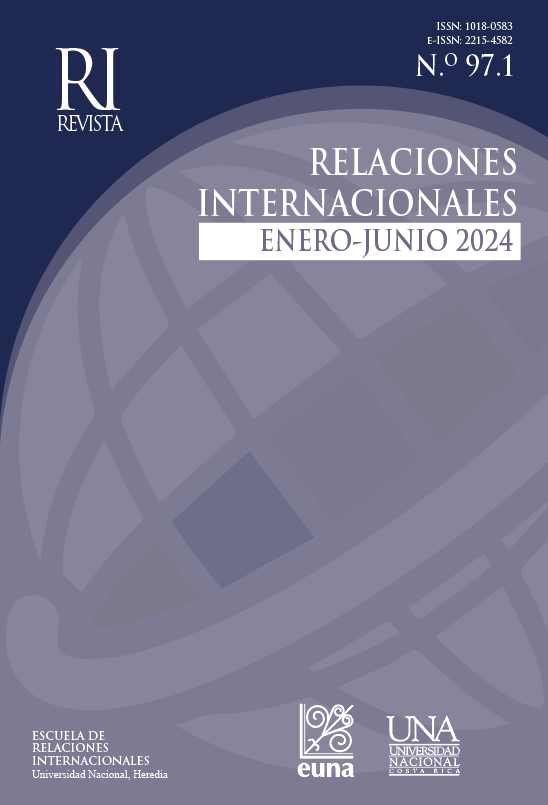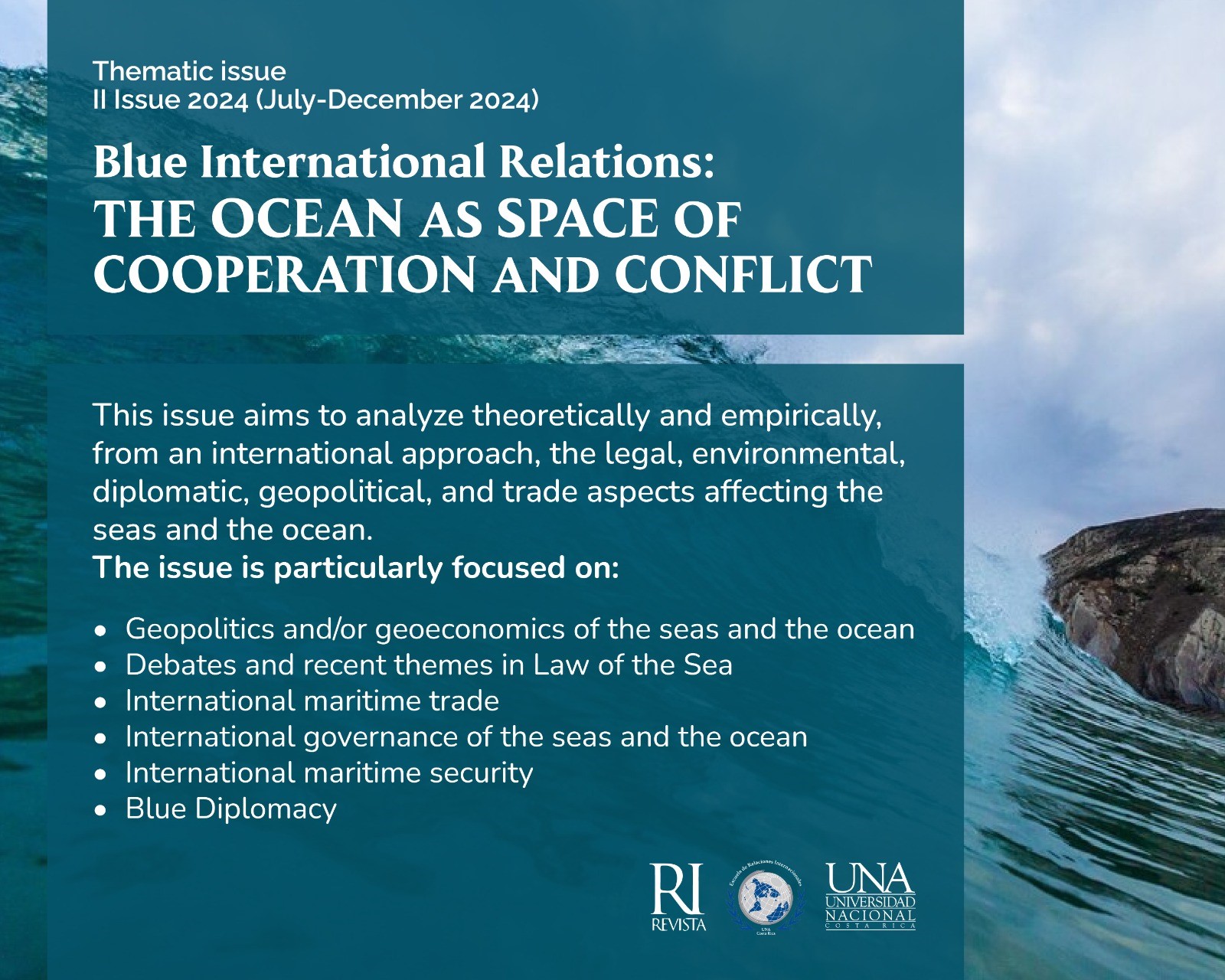Regional Integration and Economic Equality: Sociopolitical Perspectives of Regional Comprehensive Economic Partnership RCEP Countries
DOI:
https://doi.org/10.15359/97-1.1Keywords:
Asia, economics, equity, inclusive development, regional integration, Regional Comprehensive Economic PartnershipAbstract
The right to non-discrimination and respect for difference have made significant progress at the global level in recent decades. However, there has been slight improvement in terms of economic equity, even with their incorporation into the Millennium Development Goals and the Sustainable Development Goals. The situation is even worse in developing world. In the absence of effective responses from multilateral mechanisms on a global scale, the response of regional integration mechanisms seems to be more directly in tune with the imperative of social justice.
The countries of East Asia and Oceania, through integration mechanisms such as ASEAN, APEC and more recently RCEP, offer valuable expectations in terms of equity, given some advances in terms of objectives and goals that could respond more directly to the current development conditions of the countries that make up the partnership. In this context, the present article proposes to address the following question: how is the RCEP partnership doing in terms of equity and what perspectives can be envisaged from its current situation? Based on an analysis of social complexity, progress and redistributive challenges are evaluated to determine the viability of the process in the future. According to the indicators analyzed and the prospective exercise, integration is likely to deepen if the group can respond to the triple challenge of internal legitimacy, political transformation, and regional security.
References
Acharya, V., & Naqvi, H. (2012). The seeds of a crisis: A theory of bank liquidity and risk taking over the business cycle. Journal of Financial Economics, 106(2), 349-366.
Aglietta, M., & G. Bai. (2012). La voie chinoise : capitalisme et empire. Odile Jacob.
Aljazeera, (2021). ASEAN urged to take ‘decisive step’ by recognising Myanmar’s NUG. Disponible en: https://www.aljazeera.com/news/2021/10/27/asean-myanmar
Asean.org. (8 de August de 1967). The Asean Declaration (Bangkok Declaration). Obtenido en https://asean.org/the-asean-declaration-bangkok-declaration- bangkok-8-august-1967/
ASEAN. (2023). The ASEAN Way. Obtenido en: https://asean.org/the-asean-way/
Australia. (2020). Pathways to deep decarbonization in 2050: how Australia can prosper in a low carbon world. Obtenido en: https://www.climateworkscentre.org/wp-content/uploads/2014/09/climateworks_pdd2050_initialreport_20140923-1.pdf
Australian Government. Department of Foreign Affairs and Trade (2020). Annual report 2020-21.
Banco de Desarrollo Asiático. (2018). Estadísticas de desarrollo Disponible en: https://kidb.adb.org/
Benabour, R & E. Ok. (2001). Social mobility and the demand for redistribution: the POUM hypothesis. The Quarterly Journal of Economics, 116(2), 447-487.
Colussi, M. (7 de mayo de 2020). Barrios "marginales", ¿población "marginal" también? Obtenido en https://www.alainet.org/es/articulo/206399
Corak, M. (2013). Income inequality, equality of opportunity, and intergenerational mobility. Journal of Economic Perspectives, 27(3), 79-102.
Craven, C. (24/09/2019). “The Top Countries with 5G Deployments and Trials”. SDX central. https://www.sdxcentral.com/5g/definitions/the-top-countries-with-5gdeployments-and-trials/
Dabla-Norris, M. E., M. K. Kochhar, M. N. Suphaphiphat, M. F. Ricka, & M. E. Tsounta. (2015). Causes and consequences of income inequality: A global perspective. International Monetary Fund.
Deaton, A. (2021). COVID-19 and global income inequality (N.° w28392). National Bureau of Economic Research. Disponible en: https://www.nber.org/papers/w28392
de Gregori, W. de. (2002). Capital Intellectual. Administración sistémica. Bogotá: McGrow-Hill.
Education About Asia, (2020). Understanding Democracy, Security, and Change in Post-2015 Myanmar. Disponible en: https://www.asianstudies.org/publications/eaa/archives/understanding-democracy-security-and-change-in-post-2015-myanmar/
Fox, J. (2019, February 10). The Religion and State Project, Round 3. Obtenido en: https://www.thearda.com/data-archive?fid=RAS3
García, P. (2018). Globalización y regiones: El diálogo Asia-América Latina y el Caribe. Universidad Externado de Colombia.
Hacker, J. S., & Pierson, P. (2020). Let them eat tweets: How the right rules in an age of extreme inequality. Liveright Publishing.
Human Rights Watch. (2023). Bangladesh: Spiraling Violence Against Rohingya Refugees. Obtenido en: https://www.hrw.org/news/2023/07/13/bangladesh-spiraling-violence-against-rohingya-refugees
Ipsos Global Advisor. (julio de 2021). Global Views on Exercise and Team Sports. Obtenido en https://www.ipsos.com/sites/default/files/ct/news/documents/202108/Global%20views%20on%20sports%20and%20exercise%20Global%20Advisor.
Janeway, W. (enero de 2021). Cómo la desigualdad reduce el crecimiento. Obtenido en: https://nuso.org/articulo/como-la-desigualdad-reduce-el-crecimiento/
Kuznets, S. (1955). Economic growth and income inequality. The American economic review, 45(1), 1-28.
Lora, E. & Prada, S (2016). Técnicas de Medición Económica, Metodología y Aplicaciones en Colombia [en línea]. Quinta Edición.
Malthus, T. R., Winch, D., & James, P. (1992). Malthus: 'An Essay on the Principle of Population'. Cambridge University Press.
Marx, K., & Engels, F. (1975). Marx & Engels Collected Works. Vol 01: Marx: 1835-1843.
Mckinsey. (2023). Asia on the cusp of a new era. Obtenido en: https://www.mckinsey.com/mgi/our-research/asia-on-the-cusp-of-a-new-era
Ministry of Environment. (2021). New Zeland’s projected greenhouse gas emissions to 2050.
OECD. (2009). Green growth in action: Korea. Climate Works.
OPHI. Oxford Poverty and Human Development Initiative, (2020). Charting pathways out of multidimensional poverty: Achieving the SDGs.
Organización Mundial de la Salud. (2021). Banco Mundial y OMS: la mitad del mundo carece de acceso a servicios de salud esenciales y los gastos en salud abocan aún hoy a la pobreza extrema a 100 millones de personas. Obtenido de https://www.who.int/es/news/item/13-12-2017-world-bank-and-who-half-the-world-lacks-access-to-essential-health-services-100-million-still-pushed-into-extreme-poverty-because-of-health-expenses
Parlamento Europeo (1957). Tratado de Roma (CEE). Sobre el parlamento. https://www.europarl.europa.eu/about-parliament/es/in-the-past/the-parliament-and-the-treaties/treaty-of-rome
Piketty, T. (2014). Capital in the Twenty-First Century: a multidimensional approach to the history of capital and social classes. The British journal of sociology, 65(4), 736-747.
Science Council of Japan. (2005). Japan Vision 2050.
Stromseth, J. ed. (2021). Rivalry and Response. Assessing Great Power Dynamics in Southeast Asia. Washington: Brookings Institution Press.
The good country. (2020). The Good Country Index.
Transparency International. (2020). Corruption Perceptions Index. Obtenido de https://www.transparency.org/en/cpi/2020/index/nzl
Undesa, (2020). World social report 2020. Inequality in a rapidly changing world. Department of economic and social affairs
Vásquez, I. y McMahon, F. (2020). The human freedom index 2020. Cato Institute and the Fraser Institute
World Bank. (2020). Education Statistics. Obtenido en: https://databank.worldbank.org/source/education-statistics-%5E-all-indicators
World Bank. (2021). Gini Index (World Bank Estimates). Obtenido en: https://genderdata.worldbank.org/indicators/si-pov-gini/
World Bank Group. (2022). Correcting Course. Washington: World Bank Group.
World Justice Project. (2022). Rule of Law Index. Washington: World Justice Project.Xinhuanet. (18/10/2017). China Focus: Xi unveils plan to make China “great modern socialist country by mid-21st century.
Downloads
Published
How to Cite
Issue
Section
License

Revista de Relaciones Internacionales por Universidad Nacional de Costa Rica está bajo una Licencia Creative Commons Atribución-NoComercial-SinDerivar 4.0 Internacional








1.png)







3.png)
